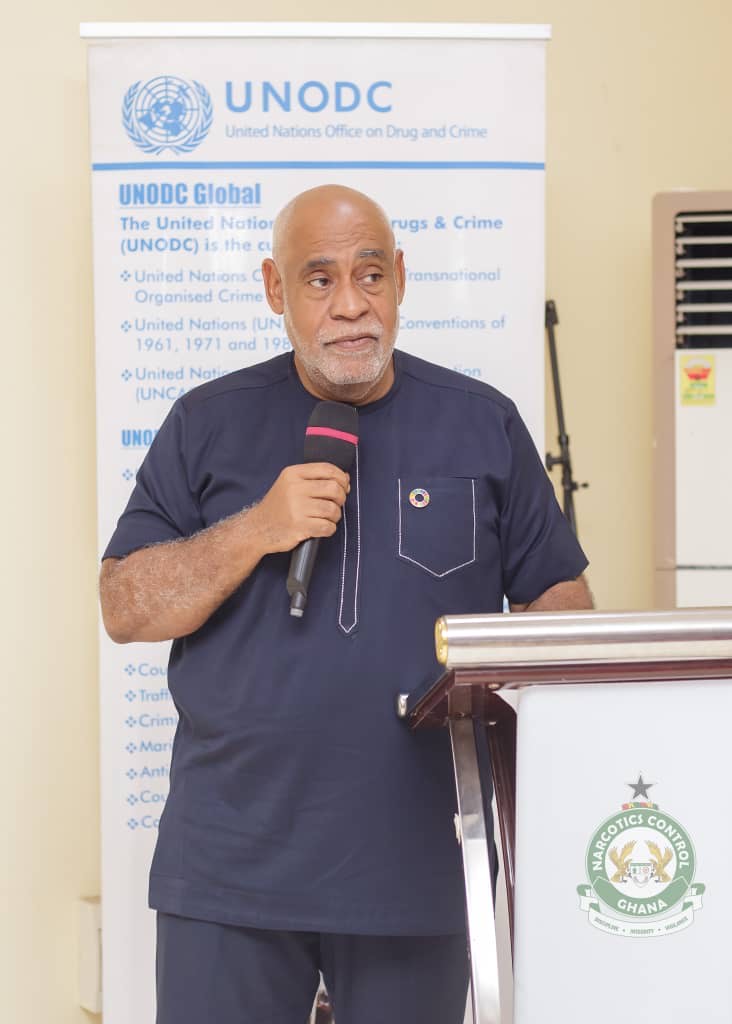By Edward Dankwah
Accra, July 24, GNA – The United States Department of State’s Bureau of International Narcotics and Law Enforcement Affairs (INL) and the United Nations Office on Drugs and Crime (UNODC) are to train Narcotics Control Commission (NACOC) staff on counter-drug trafficking.
Participants are expected to go through modules on operational security, intelligence collecting and analysis, judicial processes, handling offenders who have been involved in drug trafficking activities.
During the opening ceremony of a two-week capacity building programme in technical and logistical assistance to counter drug trafficking for the NACOC officers held on in Accra, Mr Charles Abani, the UN Resident Coordinator, reaffirmed his office’s commitment to assisting NACOC in carrying out its mandate, primarily to combat the threat of illicit drug trafficking.
He asserted that the UN over time had invested resources to maintain durable peace in Africa, inclusive economic transformation and support the government of Ghana in the provision of basic social amenities.
Mr Abani said inclusive economic transformation was where no one was left behind and that women, young people and people with disabilities were included in the economic decision process.
The UN Resident Coordinator said NACOC was performing an important role of maintaining peace in the country, and therefore the UN was always ready to assist NACOC in enhancing staff capabilities to focus on clumping down on persons found to be indulging in the act of trafficking drugs.
Mr Kenneth Adu-Amanfoh, Director-General of NACOC, on behalf of the Board and Management thanked the US Government for working with UNODC to assist NACOC in building the capacity of staff.
He emphasised that the training programme would enhance and expose participants to new methods of dealing with the drug trafficking issues and advised participants to seize the chance to learn and explore best practices in their field of work.
“I am pleased to inform everyone that NACOC is currently represented at each of the sixteen administrative capitals across the nation thanks to the ongoing efforts being made by management. We have also started opening some district offices, mostly to enhance and expand our footprint around the nation,” the Director-General said.
Mr Ron Fleming, the Counter Narcotics Advisor for the INL, expressed confidence in his organisation’s ability to maintain a productive working relationship with NACOC and successfully carry out its mandate in accordance with international and professional standards.
He promised that the INL would continue to work closely with the relevant agencies, including UNODC and the Ghanaian government, to provide further training on anti-drug measures to officers of NACOC.
Mr Bernard Asamoah, the UNODC Country Coordinator, stated that the two-and-a-half- year sponsorship was necessary as a result of a need assessment exercise that was conducted as part of the transitional process from the then NACOB to NACOC.

He expressed hope that the training would contribute significantly to strengthening and enhancing officer’s fundamental abilities to carry out their duties as mandated by law.
Mr Asamoah expressed gratitude to the INL, DEA, and NACOC management for working together over the years to combat the drug trafficking threats and hinted at plans to begin talks with the DEA on similar future engagements to train officers of NACOC.
As a result, the programme was facilitated with sponsorship being offered by the US Government through the INL in order to build and increase the respective capacities of officers of the Commission.
The training programme is being implemented by the UNODC in close collaboration with NACOC and is fully funded by US Department of State’s Bureau of International Narcotics and Law Enforcement Affairs (INL) is mainly to train and expose participants to both strategic and practical measures in counter drug trafficking.
GNA